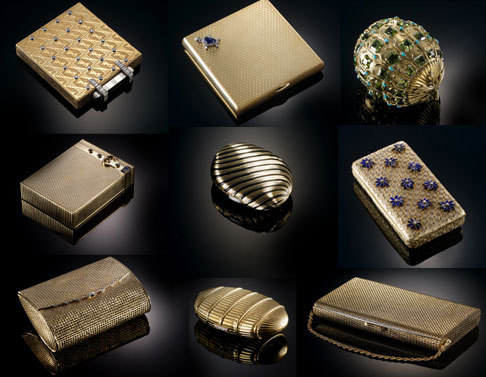Forbidden City's stolen reputation
At 11 am on Monday, Tracy Wong received an e-mail in Hong Kong from Beijing's Palace Museum, saying some art pieces on loan from her museum had been stolen overnight. "I was shocked," she said.
|
|
|
Nine pieces of art, mainly Western-style gold purses and cosmetic containers covered with jewels and made between 1920 and 1945, were stolen from an exhibition in the Palace Museum at midnight on May 8. |
Others became concerned, too, about security at the Palace Museum, also known as the Forbidden City. How could thieves easily break into what was once the most protected place in the capital?
Answers touch on the quality of guards, the vulnerability of transitioning to a new security system and the amount of money available for critical equipment.
But those were not at the top of Wong's mind on Monday morning. "My first reaction was to bring all the exhibition items immediately back to Hong Kong."
Wong is curator of Hong Kong-based Liangyi Museum, which had lent 19 pieces of wooden furniture and 111 Western-style purses and cosmetic containers to the Palace Museum for an exhibition from April 29 to June 27.
After reading the e-mail, she had an emergency meeting with Fung Yiu-fai, a collector and the owner of Liangyi Museum. Fung decided to continue the temporary exhibit and send additional art items to Beijing because he was confident in the Palace Museum and the country, Wong said.
At first, they did not know how many and which items were stolen, because nobody except the police had been allowed to enter the crime scene.
"Mr Fung kept repeating, 'It's OK as long as "the ball" is not taken away,'" she said.
"The ball" refers to his favorite piece - a Tiffany egg-shaped gold cosmetic container inlaid with olivine and turquoise stones. Wong said a jewelry appraiser told her that none of the mines that produced this type of olivine is still operating.
After six hours of waiting, Fung and Wong learned that nine gold purses and cosmetic containers covered with jewels were stolen. Two items had been found, but were damaged, at the foot of a wall on the east side of the museum. "The ball" is on the list of missing items.
At 7:40 pm on Wednesday, 58 hours after the theft, Shi Bokui was arrested at an Internet cafe in Fengtai district of Beijing and put under criminal detention. Xinhua News Agency reported that Shi, who was born in 1983, had confessed to police that he stole the art pieces mainly because he needed money.
Feng, the museum spokesman, said the suspect had been spotted and questioned by a security guard in the museum at 10:30 pm Sunday, but he fled while the guard was calling the security office. For the rest of the night, police and more than 20 staff workers searched the entire museum without success.
A large hole was later found in a display wall in the Hall of Abstinence, where the temporary exhibition was held, said Ma Jige, deputy director of the museum's exhibition department.
Alarms and dogs
Besides the ordinary security measures such as patrolling and technological defenses used by other museums, the Palace Museum also has a special force - more than 10 police dogs - to safeguard the ancient imperial palace.
The museum has a patrol crew of 240 people in eight guard divisions, according to Beijing News. After 4:30 pm every day, security guards will empty the complex, checking every corner three times. At least 1,600 anti-theft alarms, 3,700 smoke detectors and 400 surveillance cameras run day and night.
Sunday night's theft is the first in 20 years from the heavily guarded historic site.
"Our work is certainly not thorough enough if something like this can happen," Feng said at a news conference on Wednesday. "However, I hope that people will not lose confidence in the Palace Museum security."
The museum is checking equipment in all its exhibition halls, storerooms and courtyards to find potential weaknesses and to improve security measures.
"Obviously they did not pay enough attention to the temporary exhibition this time," said Zhang Jie, deputy chief of display design at the Capital Museum in Beijing. "Otherwise, it would be incredible if someone could dig the hole without being noticed."
Zhang was referring to a photo posted on the Internet. The museum spokesman denied that the photo had been taken at the crime scene.
Experts said many of the security guards who patrol at night are temporary workers who have little professional experience and are paid less than permanent museum guards. Working the night strikes many as being too easy and seems to indicate a lack of a sense of duty.
"Theft is inevitable, especially as our supervision is inadequate and security guards are mixed in quality," said Zhang Shuwei, curator of Beijing Arts Museum. "We know it will definitely happen, sooner or later."
Media reports said alarms in the museum did not function during the theft. A museum spokesman declined to comment.
The Palace Museum is in the midst of improving its security systems, a process that started in October. "It will take a while for all the newly added equipment to be put into place," Feng said. "In the meantime, the old equipment still has some problems."
The total cost of the project has reached 30 million yuan ($4.62 million), according to a Beijing-based technology company that had bid for the project. The official announcement of the cost was 12 million yuan.
 0
0 







